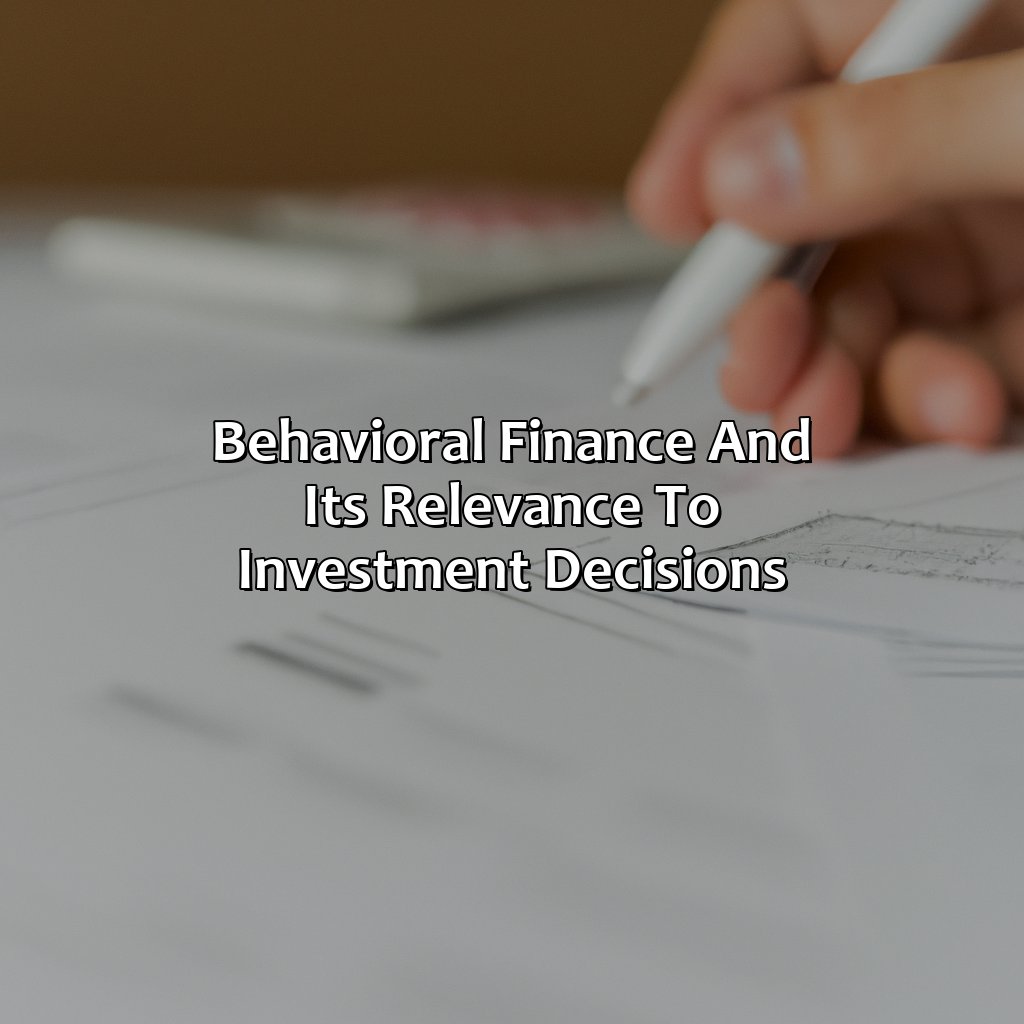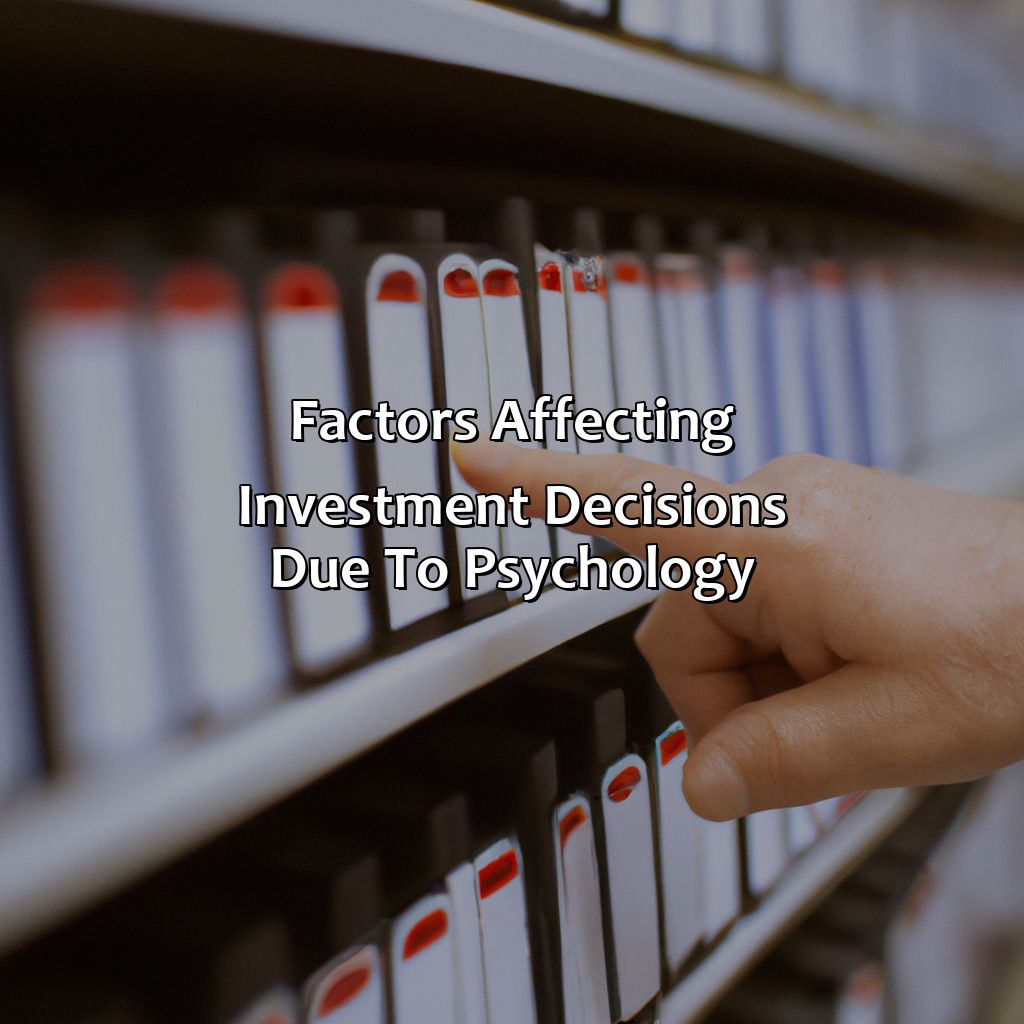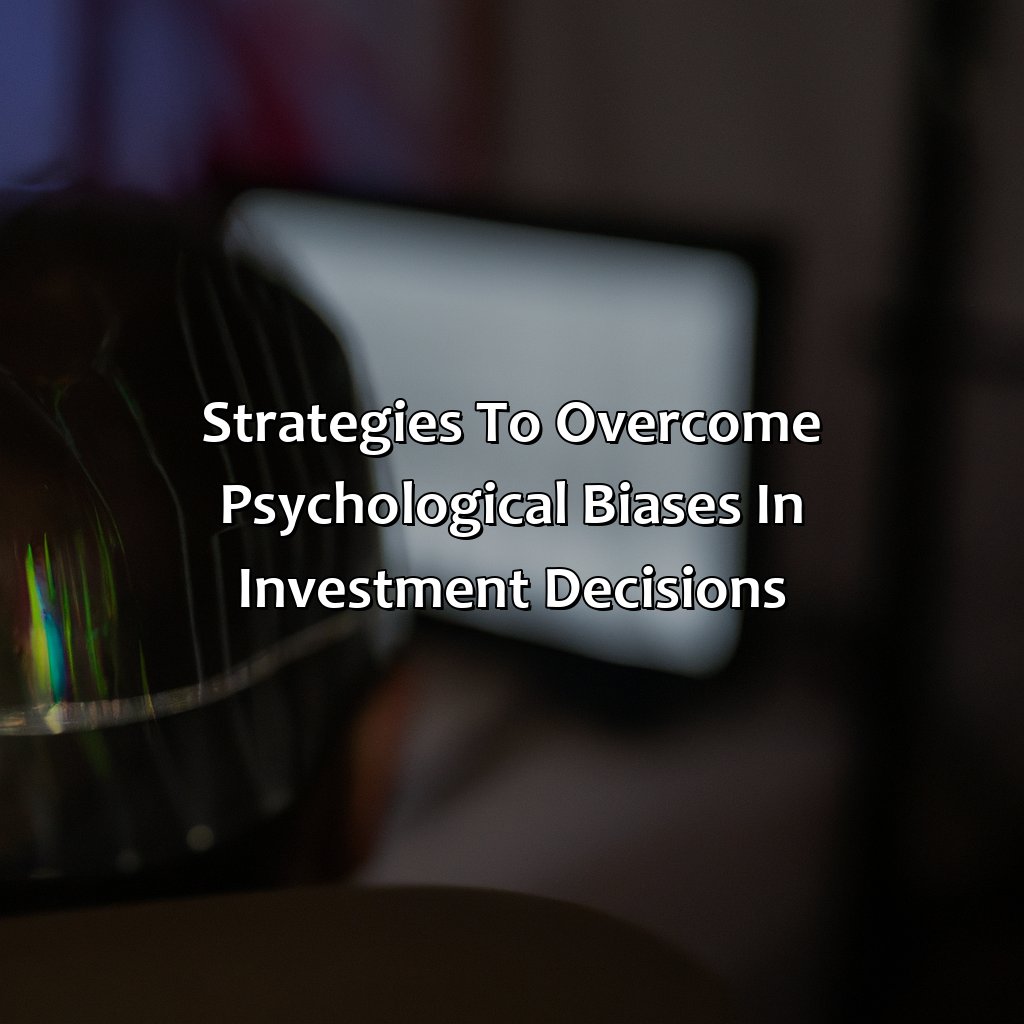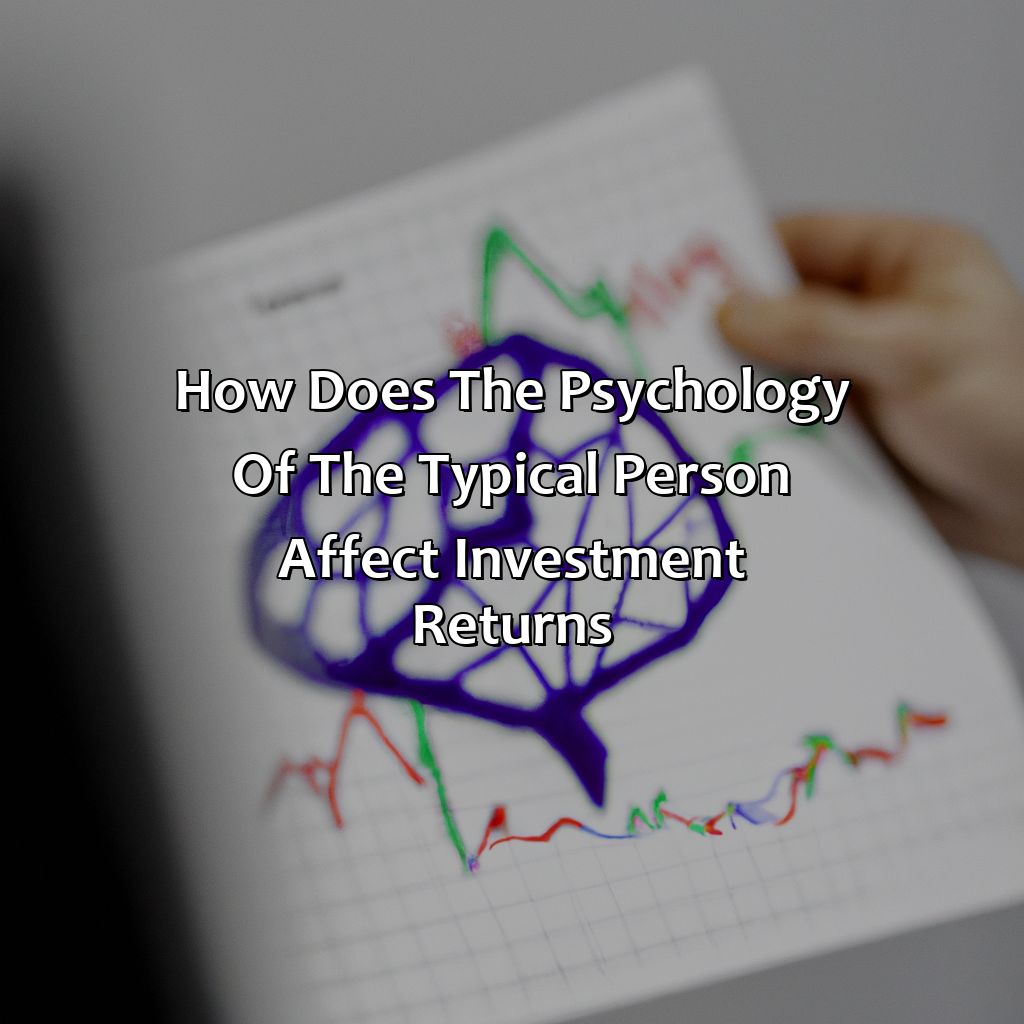How Does The Psychology Of The Typical Person Affect Investment Returns?
Key Takeaway:
- The psychology of the typical person can significantly impact investment returns, as behavioral biases often lead to poor investment decisions.
- Behavioral finance provides insight into why investors make irrational decisions and how to overcome psychological biases such as overconfidence, loss aversion, and confirmation bias.
- To minimize the impact of psychological biases on investment returns, diversification of portfolio and risk management, consultation with financial advisors and experts, and mindfulness and self-awareness techniques can be used.
Do you ever wonder why some investors make consistent returns while others fall short? It can come down to psychology, and understanding how the average person reacts to market fluctuations. In this blog post, we’ll explore how the psychology of the typical person affects investment returns.
Behavioral finance and its relevance to investment decisions
Behavioral finance explores how the psychology of individuals influences their investment decisions. It is relevant to investors as it can provide insights into how emotions, biases, and cognitive errors can lead to suboptimal investment returns.
Investors often make investment decisions based on emotions rather than data. They can be influenced by cognitive biases such as overconfidence, loss aversion, and familiarity bias. These biases can cause them to make irrational decisions, leading to poor returns.
Moreover, investors often chase past performance and fail to diversify their portfolios. They neglect the long-term perspective and ignore the value of risk management.
To overcome these challenges, investors should focus on developing their emotional intelligence, practicing patience, and relying on data-based strategies. They should also consider diversifying their portfolio and investing in low-cost index funds.
These strategies can help investors improve their overall returns and avoid making costly mistakes. By understanding the psychology of individuals, investors can make more informed decisions and achieve better outcomes.

Image credits: retiregenz.com by Adam Duncun
Factors affecting investment decisions due to psychology
For wise investments, you must recognize the effect of psychology. To comprehend how your returns could be altered by psychological tendencies, read on! This section speaks about: overconfidence bias, loss aversion bias, and confirmation bias.

Image credits: retiregenz.com by David Duncun
Overconfidence bias and its impact on investment returns
Investment decisions are highly influenced by overconfidence bias, where a person tends to believe their judgments and predictions are more accurate than they actually are. This bias often results in individuals taking on excessive risk and making poor investment choices. The impact of overconfidence bias on investment returns can be significant, leading to substantial losses.
Investors with overconfidence bias tend to trade too frequently, making them susceptible to losing more due to transaction costs and market volatility. They may also have an inflated sense of their knowledge and experience, resulting in them under-diversifying their portfolios or investing in complex financial products that they do not fully understand.
It is crucial for investors to be aware of these biases and learn how to mitigate them when making investment decisions. Seeking the advice of a professional financial advisor or diversifying one’s portfolio across various asset classes can help reduce the impact of overconfidence bias.
Pro Tip: Conducting thorough research and seeking diverse opinions from experts can help balance an investor’s perspective and reduce the influence of overconfidence bias on investment decisions. Even though it’s tempting to hold onto a losing investment, sometimes you just have to cut your losses and move on – kind of like ending a bad relationship.
Loss aversion bias and its impact on investment returns
Investors tend to feel more pain than pleasure when it comes to losses vs. gains. This emotion-driven response is called the ‘Loss aversion bias’ and can have a significant impact on investment returns. When investors experience losses, their fear response increases, leading them to sell assets too quickly or not invest at all, missing out on potential gains. Conversely, they may hold onto winning investments too long in the hope of making even higher profits.
The ‘Loss aversion bias’ is often fueled by an instinctual need for survival and security. Investors fear that losing money will harm their financial stability and well-being, causing them to react emotionally rather than rationally. This bias can result in missed opportunities and decreased returns over time.
It’s essential to recognize the influence that psychology has on investment decisions so you can develop strategies that balance rationality with emotions when investing. By acknowledging biases such as loss aversion, investors can make informed risk assessments and resist the pull of negative emotions that lead to hasty decisions.
An investor experienced massive losses during the 2008 financial crisis due to loss aversion bias. Despite market experts predicting a rebound trend soon enough, she pulled out her portfolio entirely due to fear of further losses and subsequently missed out on huge gains as the markets recovered within months instead of years.
When it comes to investing, confirmation bias can be a real downer – it’s like only listening to the songs on your playlist that you know you already love, ignoring the fact that there are other great tunes out there.
Confirmation bias and its impact on investment returns
Investors tend to experience a confirmation bias, where they emphasize information that supports their beliefs while discounting disconfirming evidence. This leads to overconfidence and makes them ignore negative news. Confirmation bias leads investors to make decisions based on false optimism, which could impact their investment returns negatively.
Research shows that investors who adhere to their initial convictions despite negative feedback suffer significant losses . Moreover, investors who make hasty decisions due to confirmation bias often do not take the time to conduct proper research or analysis leading to poor investment decisions.
Furthermore, this cognitive error can lead to groupthink whereby individuals conform to a common belief in a group context and abandon critical thinking. Groupthink mostly results in extreme market volatility, irrational pricing and contributes significantly to herd behavior in the market.
According to the Wall Street Journal in 2018, “investors who resist confirmation bias can perform better than those who fall prey.” Therefore it’s crucial for investors to regularly re-examine their investment portfolio with an open mind and gather opposing opinions before making any major financial decision.
Unlocking the secrets to overcoming your brain’s natural inclination to make terrible investment decisions, one strategy at a time.
Strategies to overcome psychological biases in investment decisions
To beat psychological biases when investing, you must use smart strategies. Diversify your portfolio and manage risk. Also, consult financial advisors and specialists. Mindfulness and self-awareness tactics can help too.
These three sub-sections are what we’ll be exploring in this part.

Image credits: retiregenz.com by Adam Washington
Diversification of portfolio and risk management
Investors can manage risk and diversify their portfolio by investing in various asset classes, sectors and geographies. By allocating investments differently, they can balance risk and reward potential. Correlations between assets should also be considered as they might affect diversification benefits. A combination of quantitative and qualitative analysis can help investors identify suitable levels of diversification.
Risk management is a crucial aspect of investment decisions, and it involves assessing potential losses while aiming for returns. Investors must take into account their risk tolerance, investment horizon, liquidity needs, and return expectations when creating a diversified portfolio.
Integrating uncorrelated or negatively correlated assets, such as commodities or currencies, with traditional asset types like equities or bonds effectively reduces overall investment risks. These alternative investments support the concentration in the portfolio while providing additional return opportunities.
According to Forbes (2018), a well-diversified portfolio reduced drawdowns during market crashes in 2008 than an undiversified one.
Consulting with financial advisors is like going to the dentist – painful in the short term, but prevents a lot of pain in the long term.
Consultation with financial advisors and experts
One effective approach to counteract psychological biases in investment decisions is seeking guidance from financial advisors and experts. Consulting with financial professionals can provide valuable insights that help investors avoid the pitfalls of cognitive biases and arrive at more rational investment decisions. It is crucial to choose a reliable advisor who has a deep understanding of your investment objectives, risk tolerance, and financial situation.
Financial advisors can offer a range of services, such as constructing diversified portfolios based on your goals and needs, monitoring market trends, and assessing risk tolerance. Seeking expert advice can also help novice investors develop confidence in their decision-making abilities. This guidance can come through various mediums such as personal meetings or digital channels like chatbots.
Additionally, financial advisors’ seasoned experience allows them to have an informed assessment of how behavioral biases affect investors’ decision-making behavior. These valuable inputs can assist in identifying any functional challenges and applying corrective action to improve performance.
Investment decisions are a minefield, but with mindfulness and self-awareness techniques, you can dodge the grenades of psychological biases.
Mindfulness and self-awareness techniques
To optimize investment decisions, it’s important to cultivate mindfulness and self-awareness. By developing a deeper sense of awareness towards our thoughts, emotions and actions concerning investments, we can mitigate psychological biases and make more rational choices.
- Take regular breaks – Stepping away from the research and data can help you avoid getting overwhelmed and keep mental clarity.
- Focus on your breathing – This technique helps you ground yourself in the present moment and re-center your thoughts.
- Engage in guided meditation – Listening to an instructor’s calming voice can promote relaxation, reduce anxiety, manage stress levels and enhance focus
- Practice introspection – Reflect upon your past investment actions with honesty to understand what mistakes were made and why they happened.
- Cultivate gratitude – Being thankful for even small gains or losses during investment periods helps shift a trader’s mindset towards a positive one which is crucial for making better decisions
- Keep a journal – Recording feelings before making trade decisions allows identifying patterns of irrational thought/behaviour that existed in previous trades
It’s worth noting that mindfulness and self-awareness exercises require practice to become effective. However, persistent efforts will improve strategic planning abilities over time. Investors need to be practicing these techniques frequently to create an instinctive response mechanism in critical financial situations. As such, cultivating self-awareness empowers investors with emotional stability allowing for the ability to acknowledge grounding presence against reactive habits.
To be mindful as an investor entails unconsciously keeping track of how their physical body feels when making trade decisions in real-time. By integrating this into their psyche they start trusting their decision-making process much more strongly. Sensitivity monitoring provides rational conviction-building power that tactfully moves the mind out of emotional thinking states. As well as elevating our self-awareness, mindfulness practice might increase focus and lower stress responses. These techniques allow the trader to maximize profits while avoiding costly misjudgments.
Some Facts About How Does the Psychology of the Typical Person Affect Investment Returns:
Emotional decision making can lead to poor investment decisions and lower returns. (Source: Forbes)
The fear of missing out can result in impulsive investment decisions. (Source: Investopedia)
Overconfidence bias can lead investors to take on too much risk. (Source: The Balance)
Confirmation bias can cause investors to seek out information that confirms their existing beliefs and ignore contrary evidence, leading to poor investment decisions. (Source: Psychology Today)
The herd mentality can cause investors to follow the crowd and make decisions based on group consensus rather than independent thinking, leading to suboptimal investment outcomes. (Source: CNBC)
FAQs about How Does The Psychology Of The Typical Person Affect Investment Returns?
How does the psychology of the typical person affect investment returns?
Studies have shown that the psychology of the typical person can greatly impact their investment returns. Emotions such as fear, greed, and overconfidence can influence investment decisions and ultimately affect returns.
What are some common psychological biases that affect investment returns?
Common psychological biases include loss aversion, where people feel the pain of a loss more than the joy of a gain, and confirmation bias, where people seek information that confirms their existing beliefs and ignore contradictory information.
How can overconfidence affect investment returns?
Overconfidence can lead investors to take on too much risk and make overly optimistic predictions about the performance of their investments. This can lead to poor investment decisions and ultimately lower returns.
How can fear and panic affect investment returns?
Fear and panic can cause investors to sell their investments during market downturns, often at a loss, and miss out on potential gains when the market eventually recovers. This can lead to lower investment returns in the long run.
What is the impact of herd mentality on investment returns?
Herd mentality, where investors follow the crowd and make decisions based on the actions of others, can lead to a lack of diversification and overvalued investments. This can ultimately result in lower investment returns.
What strategies can be used to mitigate the impact of psychological biases on investment returns?
Strategies such as setting clear investment goals, diversifying investments, and sticking to a long-term investment plan can help mitigate the impact of psychological biases on investment returns. Working with a financial advisor can also provide an objective perspective on investment decisions.
 Checkout this IRS Loophole
Checkout this IRS Loophole 
